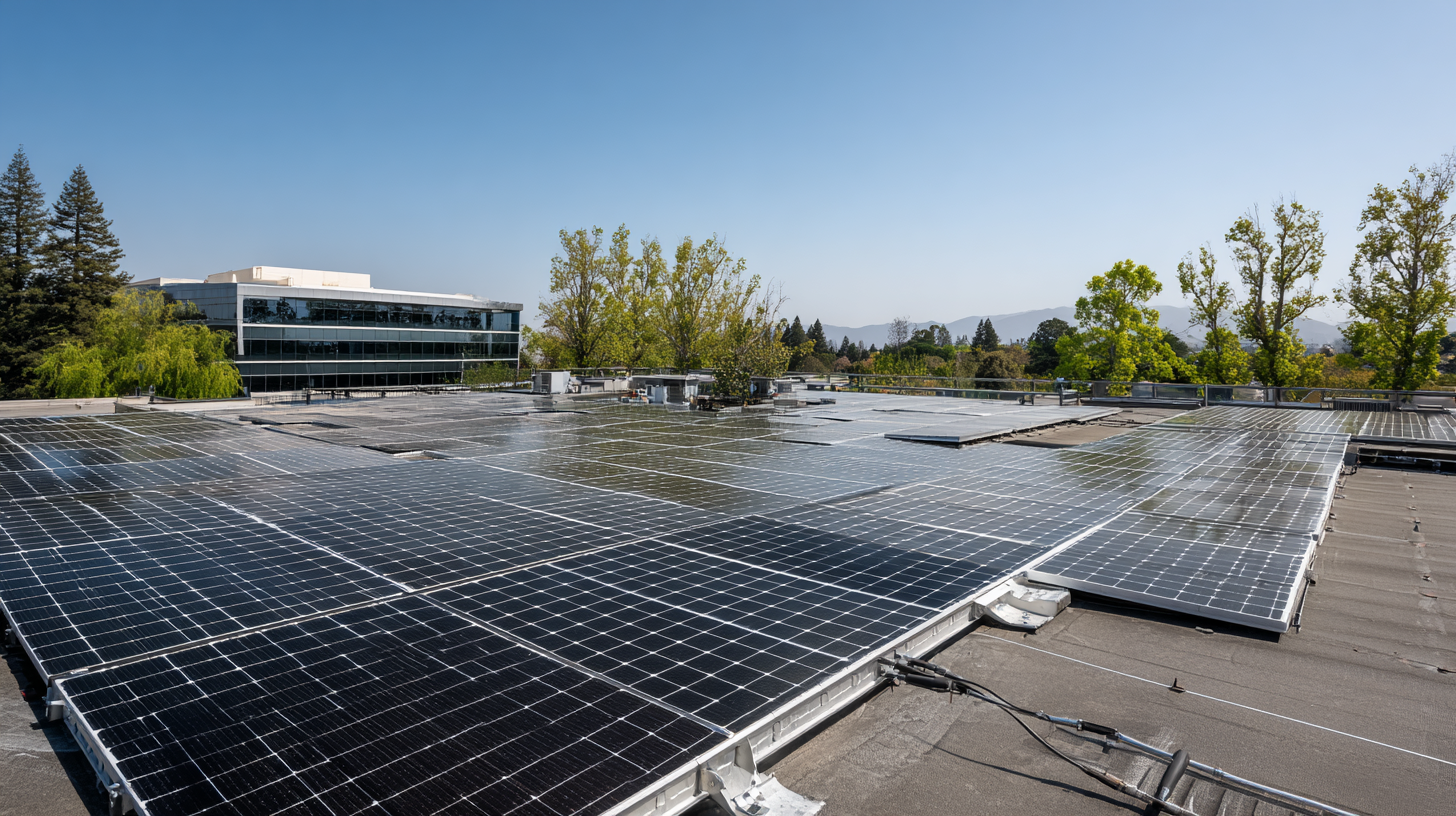Ultimate Guide to Sourcing the Best Powers Solar Solutions for Your Business
 In an era where sustainable energy solutions are not just a trend but a necessity, businesses are increasingly turning to innovative technologies to reduce their carbon footprint and operational costs. According to a recent report by the International Renewable Energy Agency (IRENA), solar power capacity has seen a staggering increase, with global installations expected to exceed 1,000 GW by the end of 2023. Among the frontrunners in this transformation are Powers Solar solutions, renowned for their efficiency and reliability. These state-of-the-art systems offer not only environmental benefits but also significant financial savings for businesses seeking to maximize their investments. As companies navigate the complexities of selecting the best solar solutions, understanding the detailed technical specifications of Powers Solar becomes critical to ensuring optimal performance and return on investment.
In an era where sustainable energy solutions are not just a trend but a necessity, businesses are increasingly turning to innovative technologies to reduce their carbon footprint and operational costs. According to a recent report by the International Renewable Energy Agency (IRENA), solar power capacity has seen a staggering increase, with global installations expected to exceed 1,000 GW by the end of 2023. Among the frontrunners in this transformation are Powers Solar solutions, renowned for their efficiency and reliability. These state-of-the-art systems offer not only environmental benefits but also significant financial savings for businesses seeking to maximize their investments. As companies navigate the complexities of selecting the best solar solutions, understanding the detailed technical specifications of Powers Solar becomes critical to ensuring optimal performance and return on investment.
Understanding the Cost-Benefit Analysis of Solar Solutions for Businesses
When considering solar solutions for your business, a thorough cost-benefit analysis is essential. This analysis not only evaluates the initial investment but also projects the long-term savings and environmental impact. Businesses often overlook potential savings from reduced energy bills and tax incentives that come with solar installation. It's crucial to gather data on your energy usage patterns and compare those with local solar installation prices to get an accurate estimate of potential returns.
Tip: Engage with multiple solar providers to get diverse quotes, and factor in available government rebates or incentives. Additionally, consider the financing options available—some companies offer lease agreements that can reduce upfront costs while still allowing you to benefit from lower electricity rates.
While the initial costs of solar installation may appear daunting, the long-term benefits often outweigh these expenses. Businesses can experience decreased operational costs while promoting sustainability, enhancing their brand image. Moreover, with advancements in technology, solar panels now offer improved efficiency, leading to faster payback periods.
Tip: Regularly monitor your energy production and savings to ensure you’re maximizing the benefits of your solar investment. This will not only help in assessing the performance of your solar solution but also provide valuable data for future energy decisions.
Key Factors to Consider When Selecting Solar Providers
When selecting solar providers for your business, several key factors must be taken into account to ensure you choose the best solutions for your needs. First and foremost, consider the provider's track record and experience in the industry. A reputable company should have a history of successful installations and a strong client base. Additionally, assess their warranty offerings; comprehensive warranties can provide peace of mind and protect your investment over time.
Another crucial factor is the technology being used. Different providers may offer various types of solar technology, including monocrystalline, polycrystalline, or thin-film solar panels. It's important to understand the strengths and weaknesses of each type and how they align with your energy needs and business goals.
Tips: Always request references from previous clients and check for reviews to gauge customer satisfaction. Furthermore, don’t overlook the financial aspects; analyze the total cost of ownership, including installation, maintenance, and potential energy savings. This comprehensive approach will help you make an informed decision, ensuring that you find the best solar solution for your business.
Exploring the Latest Technological Innovations in Solar Energy
The solar energy industry is experiencing significant technological advancements that are reshaping how businesses source and utilize solar solutions. Recent studies highlight that the global solar capacity is projected to reach 3,200 gigawatts (GW) by 2025, according to the International Energy Agency (IEA). This exponential growth is driven by innovations such as bifacial solar panels, which capture sunlight on both sides to enhance efficiency by up to 20%, making them increasingly attractive for commercial installations.
Moreover, the integration of smart technology, such as solar IoT devices, is revolutionizing energy management. These devices allow for real-time monitoring and data analytics, optimizing energy consumption and reducing costs. According to the Solar Energy Industries Association (SEIA), businesses implementing these advanced solutions can expect a 30% reduction in energy expenditures over the lifespan of their solar systems. This evolution not only supports the transition to renewable energy but also empowers businesses to enhance their operational efficiency and sustainability practices.

Evaluating the Impact of Solar Solutions on Operational Efficiency
Operational efficiency is crucial for any business striving to enhance productivity and profitability. Implementing solar solutions can significantly impact a company’s operational framework by reducing dependence on traditional energy sources and lowering energy costs. With energy expenses often being one of the largest overheads for businesses, the transition to solar power not only promotes sustainability but allows for substantial long-term savings. This shift can free up capital that can be reinvested into other areas of the business, fostering growth and innovation.
Moreover, solar solutions can streamline operations by providing a reliable and renewable energy source. This reliability reduces the risk of power outages and fluctuating costs associated with conventional energy providers, enabling businesses to plan their operational budgets with greater accuracy. Additionally, the installation of solar panels can enhance a company's image as an environmentally responsible organization, attracting eco-conscious customers and improving brand loyalty. By embracing solar energy, businesses not only contribute to environmental sustainability but also position themselves to operate more efficiently in a competitive marketplace.

Analyzing Government Incentives and Policies for Solar Adoption
As businesses increasingly turn to solar energy, understanding government incentives and policies for solar adoption is crucial for optimizing the benefits of renewable energy investments. According to the Solar Energy Industries Association (SEIA), the U.S. solar market grew by 43% in 2020, largely fueled by federal tax credits and state-level incentives. Programs such as the Investment Tax Credit (ITC), which allows businesses to deduct 26% of their solar installation costs from their federal taxes, are pivotal in making solar solutions more financially viable.
Moreover, state governments are introducing innovative policies to encourage solar adoption. For instance, net metering allows businesses to sell excess energy back to the grid, offsetting operational costs substantially. A report from the National Renewable Energy Laboratory (NREL) estimates that up to 40% of small businesses could save an average of $19,000 annually through solar energy systems, thanks in part to favorable district policies. As these incentives evolve, it’s imperative for businesses to stay informed and leverage the existing frameworks to maximize their return on solar investments and contribute to a more sustainable energy future.
Ultimate Guide to Sourcing the Best Powers Solar Solutions for Your Business
| Incentive Type | Description | Potential Savings (%) | Eligibility Criteria | Application Process |
|---|---|---|---|---|
| Federal Tax Credit | Tax credit for solar energy systems. | 26% | Must own the system; installed by a licensed contractor. | File IRS Form 5695 with tax return. |
| State-Level Rebate | Cash rebate offered by state governments. | 15-20% | Varies by state; check local guidelines. | Apply through state energy offices. |
| Renewable Energy Certificates (RECs) | Certificates that represent proof of energy generated from renewable sources. | Varies by market. | System must be grid-tied and operational. | Register with a REC program provider. |
| Net Metering | Allows businesses to sell excess energy back to the grid. | Varies based on energy usage. | Must meet utility company requirements. | Contact your utility provider for specifics. |
| Property Tax Exemption | Exemption from increased property taxes due to solar installation. | 100% | Property owner status required. | Verify with local tax authority. |